Nutrition Basics
Important to Know!
Slowly introduce unfamiliar plants or amounts into the diet to prevent digestive problems.
This is especially for animals who, up to this point, have been given fresh food in rations. This is because they tend to eat too fast and in too large an amount. Usually the migration works with many small portions given separately over the course of the day. Over time you should slowly increase the volume of each portion.

Hay
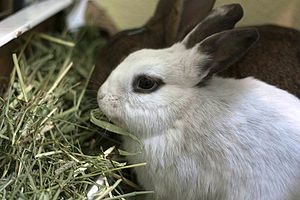 Hay is nothing more than the dried form of grass. It must be available 24/7 and as addition to fresh grass, herbs and vegetables. Hay ensures that there is always something available for the rabbits to eat to maintain correct digestive functioning. It is very important to add lots of fresh food, so that the rabbits can obtain all the necessary nutrients. It does not replace the effort needed in providing fresh food (grass, herbs, leaves, vegetables). Identify quality hay by:
Hay is nothing more than the dried form of grass. It must be available 24/7 and as addition to fresh grass, herbs and vegetables. Hay ensures that there is always something available for the rabbits to eat to maintain correct digestive functioning. It is very important to add lots of fresh food, so that the rabbits can obtain all the necessary nutrients. It does not replace the effort needed in providing fresh food (grass, herbs, leaves, vegetables). Identify quality hay by:
- Smell – similar to fresh herbs and not mouldy
- Not dusty
- Made from long blades of grass
- Packed airily & not stored in plastic bags.
It is an important raw fiber sourced and it is good for dental abrasion. Even if fresh grassland is fed, you should always provide hay 24/7.
Water
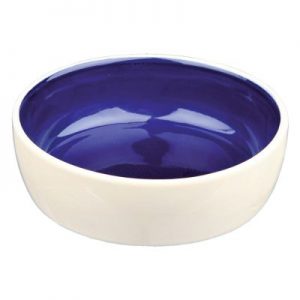
- Provide fresh water daily.
- Provide solid, heavy water bowls with sufficient fresh water.
Do not use water feeder bottles because the animals are unable to quench their thirst. They are also very difficult to clean properly. If enough space is provided, the water bowl will not become contaminated by feces, urine and/or dirt.
Vegetables

If there are not enough fresh, wild plants available, then you should give fresh mixed herbs and vegetables. Leafed food should be the main food. The green of vegetables is better than the bulbs/roots.
If the rabbit is new to vegetables, start slowly introducing first with easy to digest vegetables such as carrots and fennel.
Caution!
Be aware that some vegetables/salads can lead to dangerous bloating when fed if rabbit is given a pellet based diet and/or is used to a pellet based diet. Ensure before feeding, read the advice in our Food Encyclopedia, if unsure, do not feed.
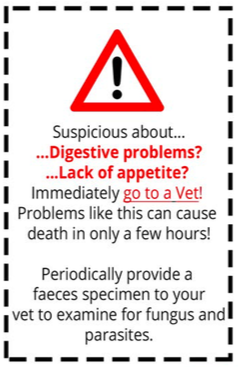
Grass, Leaves & Herbs
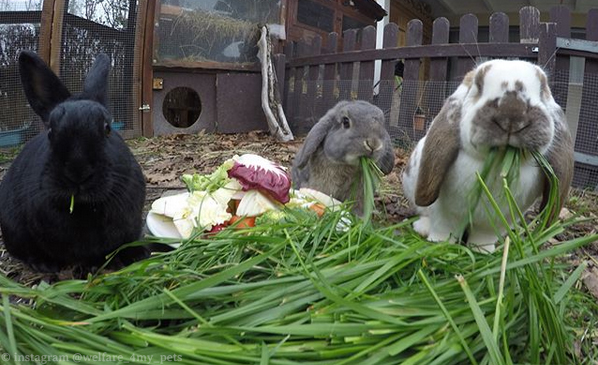 Rabbits are leaf eaters, they eat up to 80 little, fresh meals daily. This is important to ensure that their ever-growing teeth get the optimum amount of abrasion.
Rabbits are leaf eaters, they eat up to 80 little, fresh meals daily. This is important to ensure that their ever-growing teeth get the optimum amount of abrasion.
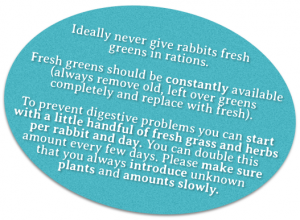 By continuously eating fresh leaves, the food does not stay for too long in their sensitive digestive tract. This prevents indigestion and the spreading of pathogens. Therefore they are reliant on always having proper food.
By continuously eating fresh leaves, the food does not stay for too long in their sensitive digestive tract. This prevents indigestion and the spreading of pathogens. Therefore they are reliant on always having proper food.
A diverse mix consisting of fresh grasses, wild herbs and leaves from trees and bushes is the best and most natural food for rabbits. This nourishes the rabbit and prevents sickness. Fresh kitchen herbs from the supermarket are also suited well.
A good plant mix consists 50% from grasses. The other 50% consists of varied, well tolerated herbs and leaves. Some examples of these are: dandelion, lucerne, clover, yarrow & plantain. Ensure that you feed a variety of plants and not just a single type in a large amount.
Dried leaves from trees and flowers can be fed. Dried herbs contain lots of minerals and the calcium amount is often high. If your rabbit is prone to developing bladder stones and bladder sludge, you should feed foods with less calcium content.
Healthy animals also should just be given a small amount of dried herbs as treats. Too many dried herbs being fed reduces the healing factor they provide. Fresh herbs can be given to healthy animals without hesitation. The high calcium content is not harmful to the kidneys due to the water content of fresh plants.
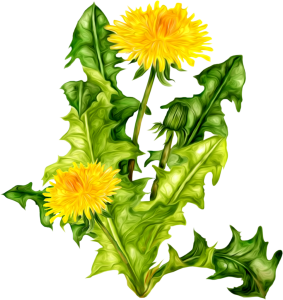
If the rabbit is new to foraged foods, first start by slowly introducing easy to digest foraged foods such as dandelions. Every part of the plant is safe for rabbits and they absolutely love it.
Important to Know!
- Connector.Connector.
Do not feed plants that are:
Close to streets, protected or have been sprayed. Some grasses are very poisonous. Inform yourself first before feeding.
- Connector.Connector.
Make sure to:
Feed fresh food, as fresh as possible!
- Connector.Connector.
Why?
It deteriorates very quickly. So place it in a shaded area, and spread out so it cannot overheat or attract mould!
- Connector.Connector.
Why is mould bad?
If food is mouldy and is eaten, it can ferment and cause severe digestive problems!
- Connector.Connector.
What if it is hot outside?
Collect plants from the shade and after collecting them, separate them and lay them in the shade.
- Connector.Connector.
Rabbits are selective feeders!
They will choose the most nutritious and tasty parts of their food. Provide slightly more food to provide them the opporunity to select what they wish to eat most.
Lettuces
Lettuce can be given as supplementary foods. They supply large amounts of water. Unfortunately many varieties are quite poor in nutrients. This is why they are only partially suitable as a main food source. Offering one type in large amounts is not reccommended. This can promote diseases such as bladder sludge. In the best case scenario, rabbits can choose from a different variety of fresh food at any time. Here as with all new introduced foods; introduce all new plants and amounts into the diet slowly. All green food should never be rotten or mouldy. Lettuce can be given with a good mixture of other fresh leafed vegetables and other fresh herbs.
Refer to the Food Encyclopedia for lettuce varieties.
Fruits & Berries
Fresh fruits are suitable as a healthy treat. Feed rarely due to their high sugar content. Rabbits in the wild will only consume, if at all, fruits in very small amounts.
Can be fed as a treat, eg. once a week a slice of apple.
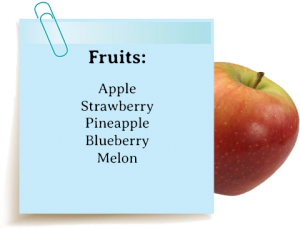
Grains & Seeds
Rabbits are plant eaters and not seed eaters. In the wild, seeds consist of, over the course of the year, only 2-3% of a rabbit’s diet.
You should only feed untreated seeds which are explicitly stated for consumption. Wild rabbits consume, depending on availability, some crops, seeds of grasses and other plants as food supplements. Therefore they are suitable in small amounts as food supplements for your rabbits.

As a healthy supplement, and especially to build up weak animals, you can give grain (to feed as close to what is natural as possible, feed the whole panicle of the grain) and other seeds.
They supply important amino acids and essential fatty acids, which cannot be obtained by only hay, vegetables and fruit. You should feed them sparingly as they are calorie dense. As a benchmark give no more than one table spoon per animal, per day, depending on the size, style of keeping and health status of the rabbit.
Wheat is unsuitable and poorly digested because of the high gluten level.
Vitamin D
Is essential for the regulation of calcium and phosphorous metabolism. For example, a deficiency of vitamin D leads to abscess in the jaw, caused by too little calcium being stored in jaw-bone tissue. With the help of unfiltered sunlight, rabbits can produce vitamin D through UV-Beta radiation. UV-Beta radiation does not penetrate windows. Therefore rabbits must be exposed to unfiltered sunlight (garden, balcony or open roof window. Do not give supplemental vitamin D compounds as this has devastating ramifications when overdosed.
Branches
Every rabbit has lots of fun gnawing and nibbling on branches. It is very healthy and helps maintain good intestinal health. You can feed them branches, with and without leaves daily and year round. Ensure that the branches have not been sprayed. These plants can mainly be found in Europe. There may be other varieties available in your region.

Dried Herbs, Leaves & Flowers
You should always provide fresh food plus a mixture ideally of FRESH herbs, leaves and flowers.
Dried herbs, leaves and flowers can be a good dietary supplement for rabbits. This is especially so in Winter or if there are no fresh wild or kitchen herbs available.
The rabbits should be fed a sufficient amount of fresh food and in this case, a mixture of dried herbs. However there are several disadvantages compared to fresh herbs, leaves and flowers.
• Dried food has been deprived of most of its water. About ⅘ of the water content has been lost. This results in a more concentrated form, and leads to satiating the rabbit very quickly.
• The ingested food requires longer to pass through the digestive tract than fresh food and depending on the structure, can increase the spread of pathogens, and can lead to digestive problems such as constipation and gas.
• The nutrition content is only about 50% of the fresh form.
• A rabbit’s ability to select food is restricted if the foods have been dried.
Therefore, if possible, feed dried foods only sparingly as a dietary supplement. You should always try to give fresh food and not the dried variety if possible.
Excess dried food can cause an array of different diseases. As an example, it can foster hypercalciuria (bladder sludge) and digestive problems.
Rabbits Do Not Need:
- Connector.Connector.
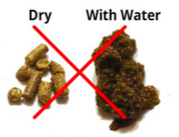
Any pellets
Because of their crumbly structure, any type of pellet will cause digestive problems. This is due to the ingredients staying very long in the digestive tract. They absorb water causing them to swell inside the stomach and deprives the body of water. This causes stomach overloading, constipation and gas.
- Connector.Connector.

Commercially available dried food
This food often contains pellets which are very dangerous in the long run. It is better to feed natural, unprocessed products. Make sure that your food consists of nothing pressed, coloured or reduced to small pieces.
- Connector.Connector.
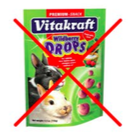
Baked goods & finished treats (yoghurt drops, treat sticks etc.)
These ingredients are harmful. They damage the intestinal flora & promote the spread of germs. They also make the animal overweight & satiated too quickly.
- Connector.Connector.
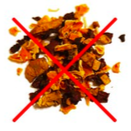
Dried veggies & fruit
They are highly absorbant & become swollen, causing stomach overloading. Few varieties, like cranberries & pea flakes, are ok in small amounts.
- Connector.Connector.

Mineral licks
Fresh food & hay has more than enough calcium. Too much calcium leads to sediment in the bladder. Gnawing stones & vitamin compounds are needless. Added vitamins should just be given in the case of disease by a vet. In a balanced diet all vitamins are obtained through the food & cecotropes.
Back to Nutrition
